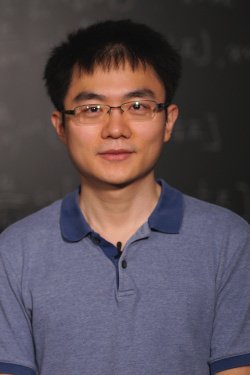Chenhao Jin
2021 Regional Award Winner — Post-Doc

Current Position:
Assistant Professor
Institution:
University of California, Santa Barbara (previously, Cornell University)
Discipline:
Condensed Matter Physics

Current Position:
Assistant Professor
Institution:
University of California, Santa Barbara (previously, Cornell University)
Discipline:
Condensed Matter Physics
Recognized for: Physicist Chenhao Jin, PhD, has established himself as an exceptional young experimentalist in a new area of physics, known as two-dimensional materials. His research on two-dimensional van der Waals materials and heterostructures has led to a number of exciting experimental discoveries, including the discovery of new types of quantum phases and the development of an innovative, energy-efficient memory storage device. Jin has also developed a number of revolutionary optical techniques to capture the interesting physics displayed by these 2D-materials.
Areas of Research Interest and Expertise: 2D Materials, Moiré Superlattice, Spin-Valley Physics, Magneto-Optical Imaging, Spin Fluctuations
Previous Positions:
BS, Peking University, China
PhD, University of California, Berkeley (Advisor: Feng Wang)
Postdoctoral Associate, University of California, Berkeley (Advisor: Feng Wang)
Kavli Fellow, Cornell University (Advisor: Kin Fai Mak & Jie Shan)
Research Summary:
Physicist Chenhao Jin, PhD, is considered a young leader in the field of condensed matter physics. His research focuses on a unique set of advanced two-dimensional (2D) materials, known as van der Waals (vdW) materials and heterostructures. Two-dimensional vdW heterostructures are materials that are only one single atomic layer thick, and are stacked one on top of the other and held together by weak van der Waals forces. His work with two-dimensional semiconductors, like WSe2 and WS2, has led to the discovery of exciting new types of quantum phases.
Jin has also developed a number of state-of-the-art optical imaging techniques that can capture and record the evolution of new quantum physics, in real-time, and then replay the experimental observations—like a movie. His experimental work on 2D semiconductor materials, in combination with these new advanced optical techniques, provides scientists with a new experimental platform to explore interesting, long-standing questions in quantum physics.
In addition, taking inspiration from biological systems and the efficient nature by which they harness thermal energy—in-particular thermodynamic instabilities—Jin turned his attention to a new scientific question. How can we update the information stored in a magnetic computer hard drive, more efficiently? Prompted by this question, Jin developed a fast-optical imaging microscope that is sensitive to the magnetic instabilities (fluctuations) found in 2D-magnetic materials. Armed with this new technique, Jin created a new type of memory storage device that uses energy-efficient, magnetic fluctuations to update magnetic information. This new memory storage device opens up unprecedented opportunities to explore new physics, such as quantum magnetism, and to develop new, energy-efficient computer technologies.
"Humans collaborate to perform different functions in a society; atoms interact to form diverse matters shaping the world. I aim to understand the latter by making documentary films in the quantum realm, and developing the tools to do so."
Key Publications:
Other Honors:
| 2018 | Kavli Institute at Cornell Fellowship, Cornell University |
| 2017 | Lars Commins Memorial Award in Experimental Physics, University of California, Berkeley |